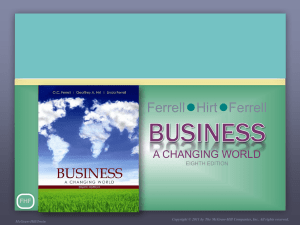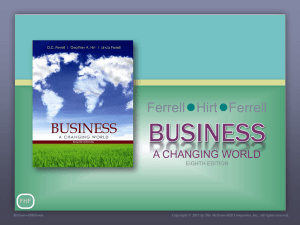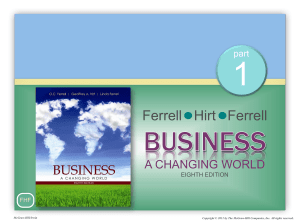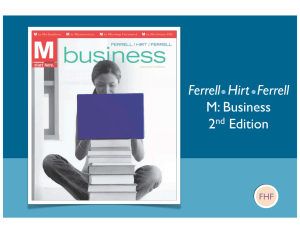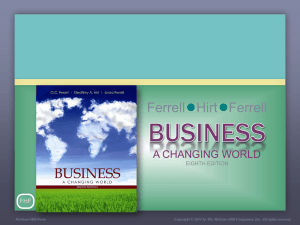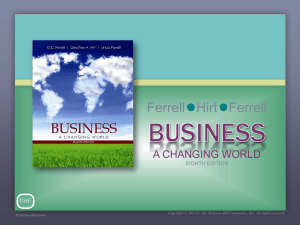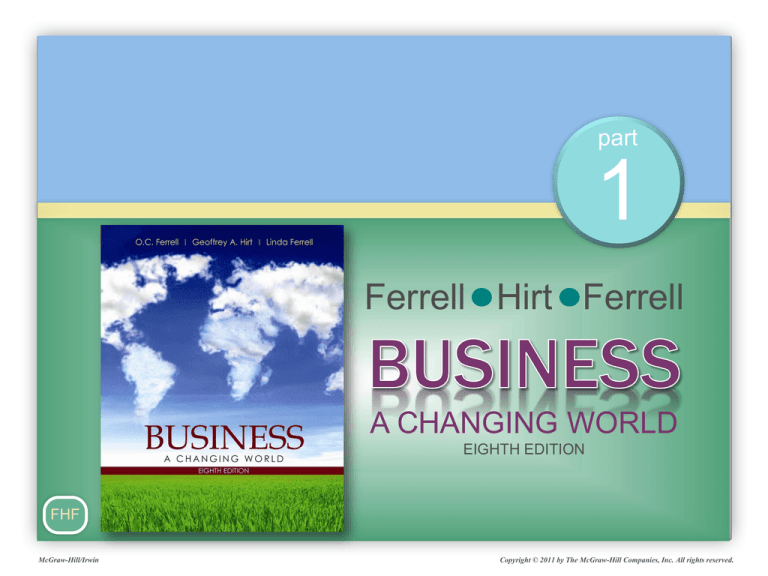
part
1
Ferrell Hirt Ferrell
A CHANGING WORLD
EIGHTH EDITION
FHF
McGraw-Hill/Irwin
Copyright © 2011 by The McGraw-Hill Companies, Inc. All rights reserved.
part
Business in a
Changing World
1
CHAPTER 1 The Dynamics of Business and Economics
CHAPTER 2 Business Ethics and Social Responsibility
CHAPTER 3 Business in a Borderless World
FHF
Business Ethics
[
An identifiable problem, situation, or opportunity
that requires a person to choose from among
several actions that may be evaluated as right or
wrong, ethical or unethical
]
FHF
2-3
Social Responsibility
Business’s obligation is to maximize its positive
impact and minimize its negative impact on society
FHF
2-4
Laws and Regulations
Laws and regulations encourage businesses to
conform to society’s basic standards, values, and
attitudes.
Sarbanes-Oxley Act, 2002
Troubled Assets Relief Program
FHF
2-5
The Role of Ethics in
Business
Growing concerns about legal and ethical
issues in business
Antitrust violations
Accounting fraud
Cybercrimes
Unfair competitive practices
Tax fraud
FHF
2-6
Ethical Issues
[
An identifiable problem, situation, or opportunity
that requires a person to choose from among
several actions that may be evaluated as right or
wrong, ethical or unethical
]
FHF
2-7
Ethical Issues
Involve all organizational activities
•
For profit businesses
•
Non-profits
•
Government
•
Schools and universities
Learning to recognize and resolve ethical issues are
important in maintaining an ethical business climate
FHF
2-8
Ethical Conduct Helps To:
Build Trust
Promote confidence
Validate relationships
FHF
2-9
How to Judge the Ethics
of a Situation
Examine the situation from your stakeholders’
position, including customers and competitors
People often need years of experience to
accurately recognize and react to ethical situations
Ethical situations vary by culture
FHF
2-10
Unethical Behavior in
Business
Misuse of company resources
Abusive & intimidating behavior
Conflict of interest
Fairness & honesty
Communications
Business relationships
FHF
2-11
Sources of Unethical
Behavior
Misuse of Company Resources
The most commonly observed misconduct
Time theft
Stealing office supplies
Use of personal email and social networking sites at work is a
growing problem
Unauthorized use of equipment and software
FHF
2-12
Sources of Unethical
Behavior
Abusive and Intimidating Behavior / Bullying
FHF
2-13
Sources of Unethical Behavior
in Organizations
Conflict of interest
Advance personal interest over others’ interests
Benefit self at the expense of the company
Bribes represent a conflict of interest because they benefit an individual at
the expense of an organization or society
FHF
2-14
Fairness & Honesty
Are at the heart of business ethics
How employees use resources
No deceit, coercion, or misrepresentations
Fair competition
Disclosure of potential harm caused by products
FHF
2-15
Ethical Concerns in
Communications
False/misleading advertising
Deceptive personal selling tactics
Truthfulness in product safety and quality
Unsubstantiated claims
Product labeling
FHF
2-16
Ethical Concerns in
Business Relationships
Relationships with customers, suppliers and
co-workers
Ethical behavior within a business is important
Keeping company secrets
Avoiding undue pressure
Meeting obligations and responsibilities
Managers’ responsibility to create ethical work environment and
provide a positive example
FHF
2-17
Plagiarism
The act of taking someone else’s work and
presenting it as your own without mentioning
the source
A major problem in schools and business
Students copying others’ work
A manager taking credit for a subordinate’s work
Employees copying reports and passing the work off as
their own
FHF
2-18
Ethical Decisions in an Organization are
Influenced by Three Key Factors
FHF
2-19
Code of Ethics
[
Formalized rules and standards
that describe what a company
expects of its employees
]
FHF
2-20
Whistleblowing
Occurs when an employee exposes an employer’s
wrongdoing to outsiders
Many companies have internal reporting mechanisms in place
•
Avoid legal action
•
Negative publicity
Whistleblowers often treated negatively and have a difficult time finding
other work
FHF
2-21
Four Dimensions to
Social Responsibility
1. Economic
2. Legal
3. Ethical
4. Voluntary
FHF
2-22
The Pyramid of
Social Responsibility
FHF
2-23
Corporate Citizenship
[
The extent to which businesses meet the
legal, ethical, economic, and voluntary
responsibilities placed on them by
their stakeholders
]
FHF
2-24
Stakeholder Relationships:
Shareholders
Primarily concerned with profit or ROI
Financial community at large
Proper accounting procedures
Protecting owner’s rights and investments
FHF
2-25
Stakeholder Relationships:
Employees
Provide a safe workplace
Adequate compensation
Listen to grievances
Fair treatment
FHF
2-26
Stakeholder Relationships:
Consumers
Consumerism
Activities that independent individuals, groups and
organizations undertake to protect their rights as consumers
Critical issue is business’s responsibility to customers to provide
satisfying, safe products and to protect their rights as consumers.
FHF
2-27
Kennedy’s Consumer
Bill of Rights
The right to safety
The right to be informed
The right to choose
The right to be heard
FHF
2-28
Stakeholder Relationships:
The Environment & Sustainability Issues
Sustainability means conducting activities
with the long-term well-being of the natural
environment in mind.
Involves interaction between
Nature
Individuals
Organizations
Business strategies
FHF
2-29
Stakeholder Relationships:
The Environment & Sustainability Issues
Pollution
• Land
• Water
• Air
Waste disposal
Future of energy
• Alternative energy
Copyright 2009 Utopian Empire Creativeworks | Biomass Energy Plant in Cadillac Michigan
FHF
2-30
Response to
Environmental Issues
Many companies have a President of Environmental
Affairs Position
Most Fortune 500 companies have in place:
Written environmental policy
Recycling programs
Waste-reduction initiatives
Environmental consciousness can save money through reducing waste
Greenwashing, or creating a positive association with environmental
issues for an unsuitable product, service or practice
•
Is a growing problem
FHF
2-31
Stakeholder Relationships:
The Community
General community and global welfare
The Avon Foundation
Breast Cancer Awareness Crusade
Target’s Take Charge of Education program
1% of Target Red Card purchases donated to educational causes
Hardcore unemployed
•
•
National Alliance of Business funds training to help hard-core
unemployed to find work and gain self-sufficiency
Enhanced self-esteem; help people become productive members of
society
FHF
2-32

